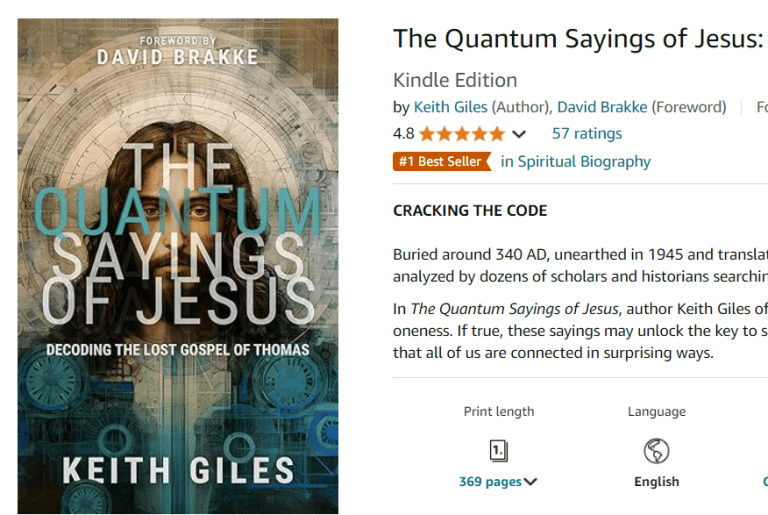
The Savior said, “There is no sin, but it is you who make sin when you do the things that are like the nature of adultery, which is called sin. That is why the Good came into your midst, coming to the good which belongs to every nature, in order to restore its root.”
Then he continued. He said, “This is why you become sick and die for you love what deceives you. One who understands, let him understand! Matter gives birth to a passion that has no likeness because it proceeds from what is contrary to nature. Then there arises a disturbance in the whole body. Because of this I said to you, ‘You shall become satisfied, and not be persuaded. You shall be joined in the presence of the likeness of nature.’ Those have ears to hear, let them hear!”
Modern Christianity is especially obsessed with defining and managing sin. So, when Jesus explains to Peter that “There is no sin, but it is you who make sin when you do the things that are like the nature of adultery, which is called sin,” it’s no small controversy.
Essentially, sin only exists in our minds. As far as God is concerned, the idea of sin has been dealt with once and for all. It has been forgiven, forgotten, and erased. We are the ones who can’t seem to stop talking about it and arguing about it and keeping track of who sins and ranking which sins are the Seven Deadliest, and so on.
As shocking as this idea seems to us, the reality is that it is perfectly in line with what we read in the Gospels and the writings of the Apostle Paul in the New Testament. For example, in the Gospel of John, Jesus says, “If you’ve seen me you’ve seen the Father.” [John 14:9]
So, if we look at Jesus to see what God is like, what do you notice? Well, one obvious thing we see is that Jesus constantly forgives.
To the woman caught in adultery? Forgiveness.
To the paralytic man lowered down through a hole in the roof? Forgiveness.
To the prostitute washing his feet with her tears and drying them with her hair. Forgiveness.
To the Roman soldiers nailing him to the cross. Forgiveness.
In fact, “Father forgive them, for they know not what the do,” is what Jesus has to say about our sin: He just forgives.
And if what Jesus does is only what he sees the Father doing, then the Father is also always forgiving us.
The Apostle Paul also reflects this sentiment in 1 Corinthians 13 when he tells us that “Love keeps no record of wrongs,” and in 2 Corinthians 5:19, “God was in Christ, not counting our sins against us but reconciling the World to Himself.”
We’re the ones keeping score, not God.
So, the concept of sin is an illusion. What we are deceived by is the illusion of separation from God which comes from our sinfulness.
Imagine, if you didn’t think you were a sinner, how would that change the way you relate to God?
If you didn’t believe that everyone around you was a sinner, how would that change the way you relate to them?
If you honestly believed that God wasn’t counting your sins against you, and that the entire world was already reconciled to God, how would that change your point of view?
Your nature is not sinfulness. As Jesus says above, “Matter gives birth to a passion that has no likeness because it proceeds from what is contrary to nature.”
In other words, the concept of sin [which is contrary to your nature] has deceived you into believing something that isn’t true about God and about yourself. Because “You love what deceives you…”, you have become satisfied with an illusion and are not persuaded by the truth of your true nature, which is good.
Why are we so obsessively focused on our sinfulness and not on our reconciliation? Especially if we are told over and over again that God is not keeping a record of wrongs and that God has cast our sins as far as the East is from the West and has remembered them no more?
Perhaps because religion has convinced us that we are worthless wretches who are not deserving of God’s love. So, we are trained to jump through the hoops to earn and receive something from God that we already have: Love, acceptance, forgiveness and reconciliation.
This is why passages like the one in Hebrews chapter 6, verses 1-3 slip under the radar of most Christians:
“Therefore let us move beyond the elementary teachings about Christ and be taken forward to maturity, not laying again the foundation of repentance from acts that lead to death, and of faith in God, instruction about cleansing rites, the laying on of hands, the resurrection of the dead, and eternal judgment. And God permitting, we will do so.“
Do you see it? At first, I didn’t, but as I read it slowly and began to trace the structure of the ideas here I realized that what the author of Hebrews was saying could be summarized like this:
“Move beyond the elementary teachings about Christ. Start moving on. Become mature by NOT continually focusing on repentance from your sins, and by NOT going on and on about faith in God, and by NOT getting distracted by religious rituals, and by NOT becoming obsessed with laying hands on people for ordination, and by NOT dividing over arguments concerning the resurrection, and by NOT preaching eternal judgment. It is God’s will that you do these things and if you do so you’ll begin to move forward.”
Simply put, we are told here – in the New Testament – to MOVE ON from things like Sin, Repentance, Resurrection, Eternal Judgment, Prayer, and Religious Rituals.
In fact, the author urges us to realize that, until we move on from these things, we will remain immature and unable to move forward in our faith.
Another way to read this might be:
“Stop talking about repentance, faith in God, the resurrection and eternal judgment as you move away from basic teachings about Christ and begin to practice the more advanced knowing of Christ.”
Sadly, this is pretty much all that Christians today want to spend their time on.
They only want to go on and on about repentance and keep us on the endless hamster wheel of weekly confession, repentance, temporary cleansing and then back again next Sunday to do the whole thing all over again, ad nauseum.
They only want to emphasize how important it is to believe the right things, and they only want to hold eternal judgment over everyone’s head to keep us under control through fear, shame and guilt.
But, as Jesus explains here in the Gospel of Mary, “There is no sin!”
Let go of that. Bury it. Walk away.
Focus instead on your nature which is good. Focus instead on the image you are created in which is love.
We were made for greater things than sin, judgment, repentance and religion.
We were made for love. Everything else is a distraction.
**

The newest book from Keith Giles, “The Quantum Sayings of Jesus: Decoding the Lost Gospel of Thomas” is available now on Amazon. Order HERE>
Keith Giles is the best-selling author of the Jesus Un series. He has appeared on CNN, USA Today, BuzzFeed, and John Fugelsang’s “Tell Me Everything.”
He co-hosts The Heretic Happy Hour Podcast and his solo podcast, Second Cup With Keith which are both available on Spotify, Amazon, Apple, Podbean or wherever you find your podcast fix.













